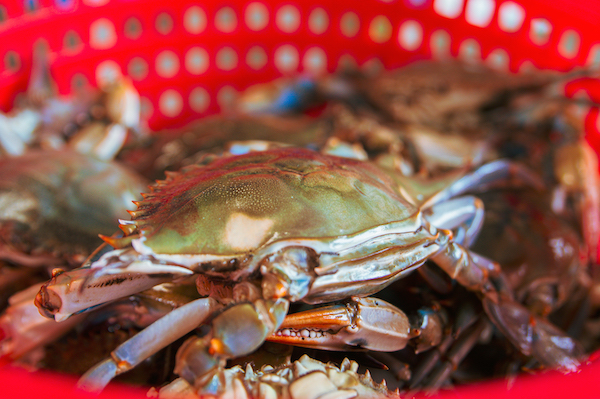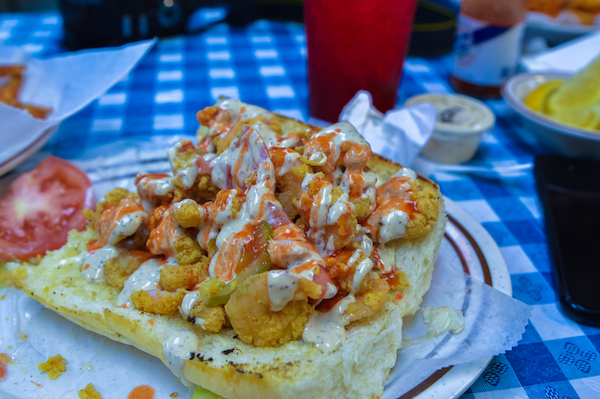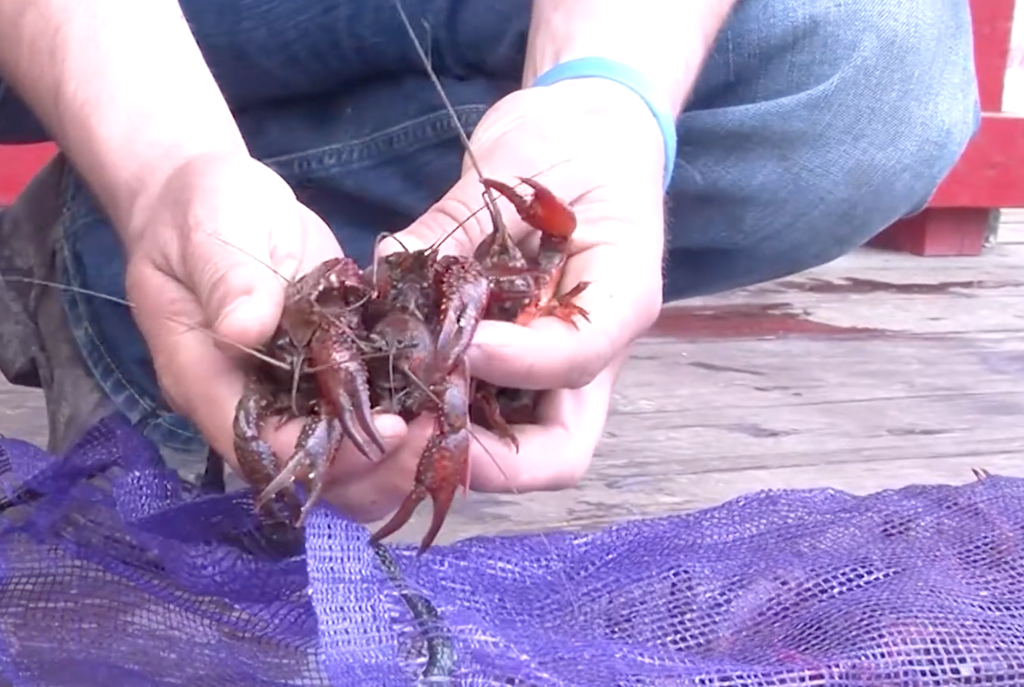Story by Kharley Redmon
Many things draw people to the Mississippi Gulf Coast each year.
Miles of beautiful beaches; Mardi Gras celebrations throughout March; museums, casinos and aquariums.
But topping the list of tourists’ reasons to travel to one of the charming coastal towns — good seafood.
However, environmental and economic challenges have threatened the stability of the Mississippi Gulf Coast seafood industry in recent years. While seafood processors, distributors and restaurateurs in Bay St. Louis have felt the impact, they have different perspectives on what is the largest threat to not only the hungry tourists’ iced-down plates of raw oysters but also one of the Mississippi Sound’s most vital industries.
Kendall Marquar, a seafood processor who owns Pinchers Seafood in Bay St. Louis was quick to point out what has been the biggest environmental challenge.
“We process shrimp, crab and oysters,” Marquar said. “We unload all the local shrimp (and crab) boats here. The oysters are gone because of the spillway disaster.”

Marquar is referring to the 2019 openings of the Bonnet Carré Spillway. The Bonnet Carré Spillway, located in Louisiana, is designed to divert flood waters from the Mississippi River to Lake Pontchartrain and eventually the Mississippi Sound.
While saving Mississippi and Louisiana communities from flooding, the influx of fresh water and pollutants into the saltwater sound causes harm to wildlife, according to a report from Mississippi State University.
In 2019, the spillway was opened twice in one year – first on Feb. 27 and again on May 10 for an unprecedented total of 123 days.
“Nineteen, when it happened, was horrible,” Marquar said. “It killed everything, it killed the oysters, it moved the crab out (and) it moved the shrimp out. Fish, everything was gone. Bad, bad algae blooms started with the 2019 openings.”
The cause for the 2019 openings was increased precipitation, according to the U.S. Army Corps of Engineers informational page on the spillway. The United States Environmental Agency said that increases in inclement weather in Mississippi – including flooding – are likely a result of climate change.
“The 12 months between July 2018 and June 2019 were the wettest ever for the U.S., the third time that record was broken just in 2019,” a 2020 Mississippi Today report about the effects of the 2019 spillway openings said.
Despite this, Marquar said that climate change is not among his concerns.
“I don’t believe climate change is hurting us,” Marquar said. “Mother Nature is going to take care of her own species, in my opinion. This year, we had very good salinity and water (and) had very good tide ranges. We never had an algae bloom this year.”
The impact of the spillway openings extend beyond the Mississippi Sound.
Chris Pomes is a seafood distributor and shipper from Louisiana who has been buying Mississippi crab for 20 years. Pomes noted the wider impact of the spillway openings, as many seafood distributors like him ship around the country.
“We bring them back, we distribute them (and) we bring them up to Baltimore,” Pomes said. “We got trucks, 18 wheelers, (and) they go to Baltimore and distribute them.”
Pomes’ perspective on climate change is similar to Marquar’s.
“I don’t pay attention to climate change,” Pomes said. “Legislation, you know, you gotta watch what they’re doing on Capitol Hill.”
Still recouping losses
Although Mississippi and Louisiana are five years out from the 2019 openings — with just one additional opening in 2020 — economic recuperation is still a work in progress.
Marquar said that, although he has not made up for all of his losses, lawmakers and organizations such as the Mississippi Department of Marine Resources have been fighting to help keep the seafood industry afloat.
“The Mississippi Department of Marine Resources has done a very good job trying to talk to the federal agencies (saying), ‘You guys are killing the Mississippi Sound. We’ve got to do something.’ A lot of livelihoods are here: fishermen, us as processors, distributors (and) the box companies we buy our boxes from. It’s a trickle effect,” Marquar said.
Most recently, the U.S. Department of Commerce allocated $2.9 million to help with the effects of the 2019 spillway openings. This funding is part of a $42 million package offering financial compensation for fishery disasters in states including California, Oregon and Alaska. In 2021, Gov. Tate Reeves initiated the process of obtaining this funding by writing a letter to the U.S. Secretary of Commerce Gina M. Raimondo.
Details for allocation and administration of the funds will be worked out in coordination with the state, according to a National Oceanic and Atmospheric Administration press release. While the specifics for this funding are to be determined, past programs have included payouts to those affected by the 2019 openings.
In November 2023, the Mississippi Department of Marine Resources announced the availability of $6.57 million for payouts — ranging from $12,000 to $108,598.60 — to commercial fisherman, seafood dealers, off-bottom oyster aquaculture harvesters and licensed live-bait fisheries.
Although many consider the $2.9 million a win for Mississippi’s seafood industry, some lawmakers such as Sen. Roger Wicker (R-Miss.) are critical of how long it took for the federal government to allocate these funds.
“This funding is helpful, but it does not make the impacted businesses whole. It should not take years for disaster funds to trickle in,” Wicker said in a press release after the funding was announced. “I will keep working to reform the fisheries disaster declaration process so the funds can be delivered to communities in a shorter time frame. I am committed to helping Mississippi recover no matter how long it takes.”
Impact of imports

While still in the process of financial recuperation from the 2019 openings of the spillway, Marquar is worried about another phenomenon’s impact on the seafood industry — imports from countries such as Ecuador and Indonesia.
According to another 2020 report from Mississippi Today, the effects of imported seafood, particularly shrimp, are something the industry has been struggling with for years.
“Shrimp were very, very cheap this year,” Marquar said. “A $1.10 for 16/20s. That’s very cheap — we’ve never seen that.”
With prices so low, Marquar hopes legislation will level the playing field.
“We have some very good organizations trying to stop it,” Marquar said. “Hopefully they can get some tariffs or something put on where our fishermen have a fair playing ground.”
Like the impacts of the spillway, the impact of imports also extend beyond the Mississippi Sound, according to Marquar.
“Our big processors, they sell all over the country,” Marquar said. “They’re saying it’s affecting them on the restaurant side, because (imports are) cheaper. Even with our prices that we are paying the fisherman. … You just can’t compete with them.”
Theodore “Teddy” Macke, originally from New Orleans, is the owner of MacBe Seafood and Cafe in Bay St. Louis, which serves a variety of seafood dishes.
Although Macke is now on the restaurant side of things, he used to be a commercial fisherman and talked about changes in the shrimping industry over the years.
“When I was a young man, I actually sold my shrimp at the dock higher than what they get for them now. And that’s 50 years later,” Macke said.
The number of shrimping fleets in the region also has decreased. According to the same Mississippi Today report, there were 1,017 shrimp fleets in Mississippi in 2002 and 254 in 2018. This decline is due to a combination of imports, climate change and other environmental disasters, including the spillway openings, the report said.
“When I was a young person my dad would go shrimping out at Lake Borgne, and he could literally walk across the boats opening day,” Macke said “Now you go out (on) the opening day and you don’t see a boat.”
MacBe’s serves a combination of local and imported seafood.
“We’ll get them both,” Macke said. “The wild-caught fish, for some reason, tastes better. Same with the shrimp. The imported stuff is kind of flavorless at times.”
Macke highlighted some challenges that Marquar and Pomes did not touch on — namely the COVID-19 pandemic.
“We’ve been in business for about seven years now,” Macke said. “The first three years in business are rough and then COVID hit, so we’re finally getting our legs back under us after that.”
Macke also talked about the risk of going into the restaurant industry. When he first wanted to get into the restaurant industry, his financial agent advised against it due to the high rate of restaurant failure both before and post COVID-19, Macke said.
While Macke has not yet been deterred from his seafood endeavor, the working conditions of the industry have made Pomes weary to get others involved.
“My son is involved in my business. I didn’t want him to be involved,” Pomes said. “The hours — we work seven days a week every day. So I didn’t want the life that I lived for him because of the hours, but he likes it.”
Pomes said that all of these factors — environmental, economic or otherwise — culminate into a constant uncertainty.
“You never know this business — it’s on and off,” Pomes said. “You make money during the summertime and you’re losing it all winter. It’s like a never ending cycle.”
Related Stories:

A combination of drought and extreme weather has led to a dramatic decrease in crawfish availability, impacting the economy and culture in the souther United States. Mississippi State University’s Raylen Ladner explores this issue in this Rising Tides, Rising Temperatures podcast episode.
